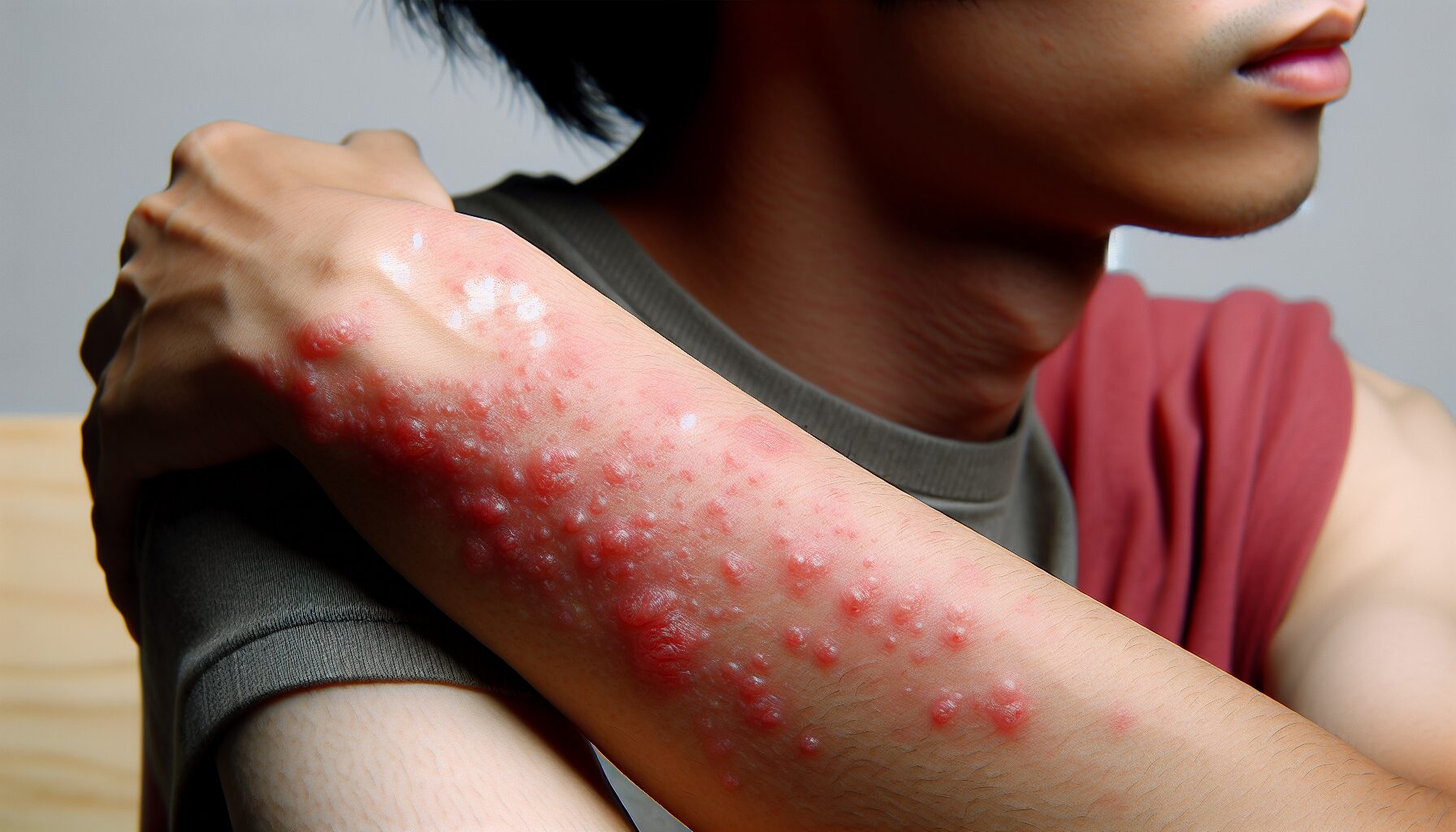
Eczema Caused By Diet And Food: Poor Diet Can Cause Eczema
Diet and eczema are highly linked by inflammatory disease researchers, with research outcomes showing that eczema can be caused by our diet. The poor nutritional content of the western diet is considered to be one main root cause of eczema.
Eczema, when presenting itself as a serious skin disease, can be detrimental to ones quality of life. The number of people affected by eczema is much higher in western, developed nations than developing nations. Roughly 10% of the adult population suffers from eczema.
People with eczema also seem to have a higher risk of developing allergic diseases, with clear interplays between immunity, systemic inflammation and eczema. Atopic dermatitis, or eczema, is an inflammatory skin condition. While some aspects of eczema are caused by certain genetic factors, many eczema outcomes are caused by diet and other inflammatory environmental influences.
There seem to be various interplays between diet and eczema, including lack of nutrients, poor diet, dietary influenced changes in gut microbes and lack of antioxidants. In many cases, these dietary influences are thought to snowball into an overall inflammatory effect within the body. This overall inflammatory effect is a key root cause of many eczema outcomes.
In this article we will explore why diet and eczema are being linked, with attention to how a poor diet can cause eczema.

How Can Eczema Be Caused By Diet
Eczema is an inflammatory skin condition. This means that any inflammatory influences in the body will most likely contribute to making eczema worse. This is especially true for skin inflammation and inflammation promoting irritants. That can include topical skin products or our diet, which has a massive influence on our body composition and also inflammatory status. Research suggests that our diets can affect eczema through changes in gut or skin microbes, body composition, immune and inflammatory status.
Dietary Inflammation And Eczema
One contributing factor to eczema may be a lack of dietary antioxidants or antioxidant vitamins. Foods rich in antioxidants include berries, green tea and dark chocolate. Diets poor in antioxidants, such as western diets, are responsible for increases in oxidative stress and could be partly responsible for resulting inflammatory skin diseases.
How Dietary Antioxidants Prevent Eczema
Antioxidants prevent build ups of oxidative stress within the body which trigger inflammatory responses, including skin eczema. They also prevent premature skin ageing and damage, offering protection of the skin barrier from external irritants or pollutants. Eczema can be caused by a diet that is poor in antioxidants.
Studies show that antioxidants such as β-carotene significantly reduce inflammatory protein production. They also improve filaggrin expression, which is crucial for skin barrier function and eczema symptoms.
The key action of antioxidants is to intercept toxins and free radicals with unusual energy states, preventing damage within the body. Our bodies can’t readily make many essential antioxidants, such as vitamin C, which is why we need to consume them regularly. Without sufficient antioxidants, the body can experience build ups in oxidative stress and which can cause the skin to have inflammatory responses. This includes eczema.
Research suggests that consuming diets rich in specific antioxidant minerals and vitamins, such as zinc, selenium, vitamin A, C and E, reduces inflammatory stress. These may all help to reduce the body’s inflammatory responses and therefore would reduce symptoms of eczema. One study showed that dietary flavonoids, which are strong natural antioxidant compounds, could reduce risks of eczema. Maintaining diets rich in antioxidants could therefore very important for managing eczema.
Inflammatory Dietary Toxins
Another dietary influence on inflammation are toxins that can inflame the gut, or gluten that causes systemic inflammation. This is another means as to how eczema can be caused by our diet.
Toxins in our food can also cause localized gut inflammation and oxidative stress, which could cause or influence eczema symptoms. Heavy metals, sweeteners, preservatives and toxins are particularly bad. This is because they can destroy the balance of gut microbes in the intestines, which can further inflame the body.
Diets rich in gluten reduce intestinal villi growth and reduce nutrient absorption, which could also cause or influence eczema. These are also important dietary factors that can be a root cause or influencing factor towards inflammatory eczema.

Dietary Influences On The Immune System
Once our immune system is heightened, we can become more sensitive to pathogens and also inflammation. This can lead to eczema symptoms. Immune activation is not necessarily a bad thing, it is a natural thing need to protect our bodies from pathogens.
While you require a strong immune system, ideally your body should also manage immune responses. This is because an overactive immune system can cause aggravated inflammation or worsen eczema symptoms. Systemic skin diseases like rosacea occur when the immune response and inflammation is dysregulated. In some individuals, certain foods or dietary influences can trigger immune responses unnecessarily. This can also be a root cause of eczema symptoms and is another way that eczema can be caused by our diet. This is sometimes then also diagnosed as food hypersensitivity.
Research shows that oxidative stress, responses to oxidative stress, skin inflammation responses and our immune system are all heavily linked. This means, as eczema is an inflammatory skin disease, negative changes to these can worsen or trigger eczema.
For example, gluten does not just affect nutrient absorption but can also cause immune responses in the gut. This can affect systemic oxidative stress and cause eczema symptoms. Avoiding foods that activate immune responses or inflammation could be very important for managing eczema symptoms.

Eczema and Gut Microbes
An overlooked dietary influence on inflammation is our gut microbe composition. Our gut microbes play a hidden role in our health. There are microbes everywhere, including in our food and gut. Gut microbes can influence our immune system and systemic inflammation, which can play an important role in inflammatory diseases such as eczema.
Essentially, imbalances of gut microbes or pathogenic microbes trigger inflammation which research shows can influence eczema symptoms. This means that, when it comes to managing or preventing eczema, one must be wary of harmful or pathogenic microbes that can cause inflammatory stress within the body. Harmful microbes in our food cause dysentery type illnesses in humans and animals too. This is on the highest end of inflammatory stress and immune system activation.
How Gut Microbes Cause Inflammation And Immune Responses
Harmful microbes can trigger inflammatory and pathogenic responses in our gut. They do this through disrupting the lining of our gut or villi, that help to absorb nutrients. This produces a negative feedback where the body is also intaking less antioxidants or other nutrients that could help to restore skin health and fight eczema symptoms. This is one of the main ways eczema can be caused by our diet.
The invasion of our gut also triggers inflammatory responses and aggravates the immune system, which could also worsen eczema symptoms. They can also make toxins that cause systemic oxidative stress and can trigger eczema. This is very similar to how gluten can cause gut inflammation and then effect eczema symptoms. Significant gut bacteria changes can trigger allergen responses and further stimulate the immune system.
Probiotic gut microbes can help to lower inflammation within the gut, especially through improving intestinal barrier function. Probiotic gut microbes may be useful for managing or preventing eczema. In addition to lowering levels of inflammation and inflammatory responses, they also strengthen our immune response. Probiotic bacteria such as Bifidobacterium and Lactobacillus have been shown to reduce symptoms of inflammatory bowel diseases, reducing proinflammatory cytokine levels.
Changing Gut Microbes Through Our Diet
Our diets strongly influence gut microbe composition and studies suggest that certain foods, like fruits or nuts, promote the growth of beneficial gut bacteria that could lower inflammation and immune system activation. You can also encourage health gut microbes through consuming prebiotics, dietary fibre and probiotic supplements or foods.
Studies have shown that levels of probiotic bacteria such as Lactobacilli and Bifidobacterium are lower in eczema sufferers. While Staphylococcus aureus levels are higher in the gut microbiome of eczema sufferers.

How Diet Can Affect Skin Microbes
Microbes are everywhere, influencing our environment and health in ways that are still unknown. Another way that microbes can influence eczema and our health is through our skin. The composition of our skin microbes can also change as we age and is unique from person to person. Often individuals with inflammatory skin diseases show imbalances in skin microbes and this is another key means as to how eczema can be caused by our diet.
Our skin can become inflamed through increased numbers of pathogenic microbes on our skin and microbial imbalances which trigger skin immune responses. For example, S. aureus skin colonization is high in over 90% of eczema patients. Certain skin microbes, including S. aureus, can increase skin inflammatory cytokine levels or reduce skin layer thickness.
Some individuals are very sensitive to changes in skin microbes and have reactive immune systems, that could be caused by chronic inflammation. This is another influencing factor that can worsen skin eczema. When invasive skin microbes invade the skin barrier, they worsen systemic inflammation and inflammatory eczema.
Our diets influence skin microbe populations and this is another way our diet can also cause eczema. For example, levels of long chain unsaturated fatty acids in the skin can directly influence skin microbe numbers and cause eczema symptoms. While encouraging probiotic strains of Bifidobacterium may help the skin to make antimicrobial peptides that protect our skin from inflammatory pathogens.

How Body Composition Influences Eczema
Considering that excessive accumulation of unhealthy body fats is considered to produce inflammatory responses in the body, our body composition may also greatly influence eczema. This is another means as to how eczema can be caused by our diet.
This is another means as to how our diet can cause eczema. Poor diets that are rich in processed foods are particularly inflammatory. Western diets are rich in processed foods and are linked to higher levels of systemic inflammation. Many western diets are calorie dense, low in quality nutrients, dietary fibre and processed sugar, which promotes inflammation. These diets are higher in inflammatory oxidised fatty acids and inflammatory compounds.
Individuals consuming higher levels of oxidised or unhealthy fats are at higher risk of inflammatory skin conditions such as eczema. Meanwhile, there is a clear correlation between eczema and obesity. Individuals with a higher BMI are also at higher risk of developing eczema and inflammatory skin diseases. This is most likely due to the accumulation of inflammatory and unhealthy oxidised lipids.
Healthy Fats And Eczema
Healthy fatty acids in our diet affect the integrity of the skin barrier and disruptions, through our diet, a lack of these can be a cause of eczema. Unusual lipid compositions or changes in skin lipids can also impair skin barrier function. A healthy skin barrier is important for preventing irritation of the skin and pathogen invasion, which trigger inflammatory responses. These responses to skin irritants can caused eczema and could be prevented through our diet.
Healthy lipids may help to normalize skin barrier production and reduce incidence of eczema. Particularly reduced levels of omega 3 and omega 6 fatty acids have been shown to be a direct cause of inflammatory skin conditions. Restrictive diets produce eczema symptoms, which is why it is important to ensure you consume healthy fatty acids.
Key Skin Barrier Nutrients
Consuming diets rich in nutrients that can replenish the skin barrier and promote healthy skin function can be very important for minimizing eczema. Some of these nutrients include healthy fatty acids, antioxidant vitamins, zinc and selenium which help the skin barrier to repair itself.
Vitamin C is particularly important because of how it can encourage improved skin collagen production. Vitamin E also supports skin barrier function, while zinc is very important too as a healing antioxidant and immune supporting mineral. Zinc supplements have been shown to reduce eczema related inflammation.
The research shows that our diet could have a massive influence on eczema symptoms through influencing skin barrier nutrients, gut or skin microbes and systemic inflammation.

Summary
Our diet and eczema symptoms are highly linked, with diet choice directly influencing inflammation and eczema. Many western diets are low in essential nutrients, which can promote conditions for inflammatory diseases like eczema.
Diets low in antioxidants promote inflammation and can cause eczema symptoms. Antioxidants help to protect the skin barrier from external irritants or pollutants, improving their function. Flavonoids and zinc have both been shown to reduce risks of eczema.
Dietary toxins such as heavy metals, gluten or sweeteners can also influence eczema symptoms. Some pathogenic toxins can trigger the immune system and this heightens systemic inflammation, creating a higher risk of eczema.
Our gut microbes can heavily influence systemic inflammation and eczema. Gut microbe imbalances trigger inflammation which can directly cause eczema. Pathogenic gut microbes and gluten can also disrupt gut nutrient absorption, which prevents the skin barrier from healing as well. They can also heighten immune responses, effecting eczema symptoms.
Probiotic gut microbes help to lower inflammation in the gut, especially through improving intestinal barrier function. Dietary fibres from fruits or nuts can improve gut microbe composition.
There are also microbes on our skin that can directly affect eczema. Individuals with inflammatory skin diseases often show imbalances in skin microbes. Pathogenic skin microbes can increase skin inflammatory cytokine levels or reduce skin layer thickness. Healthy fatty acids support skin barrier health and can reduce skin eczema.
Unhealthy fatty acids promote inflammation, causing eczema in some cases. There is a clear correlation between eczema and obesity. This may be a reason to transition, from western diets to a more antioxidant or nutrient rich diet, with beneficial microbes that support skin barrier function.
For more interesting articles, see the main articles page.




